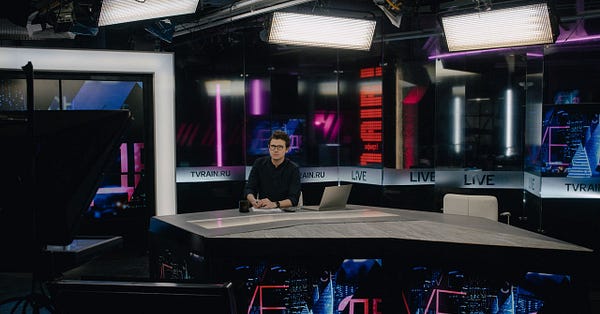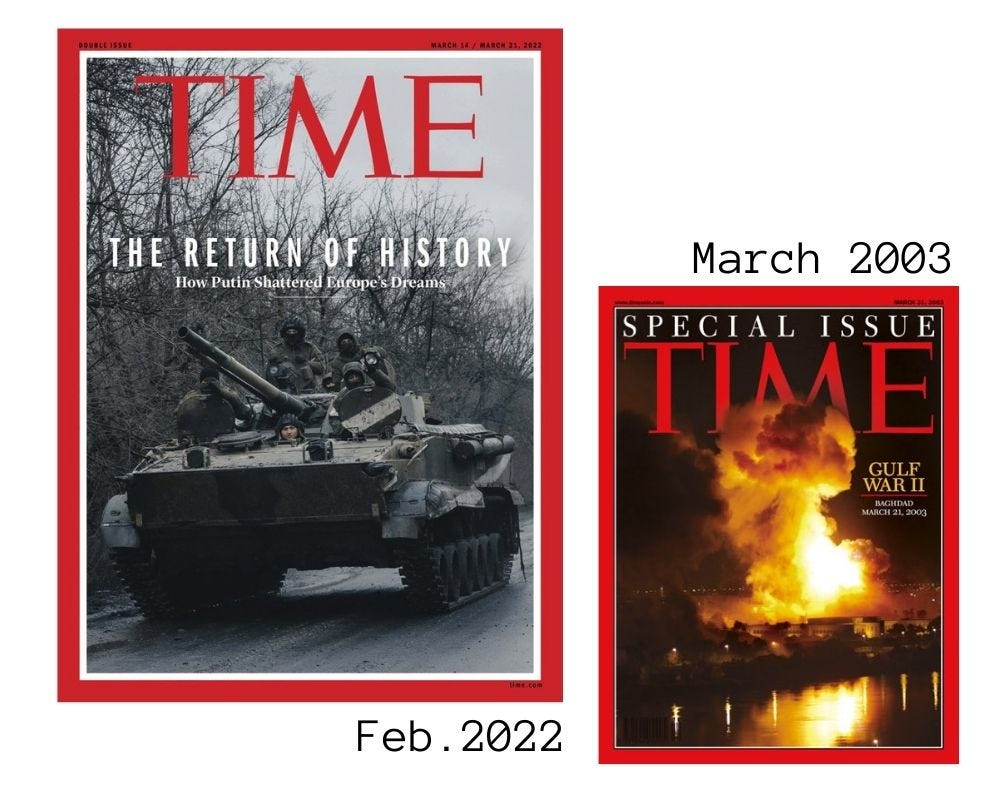Russia's Remaking of the World
The invasion of Ukraine is the culmination of Vladimir Putin's life work
Sree’s newsletter is produced w/ Zach Peterson (@zachprague). Invading sovereign countries is wrong, whether it’s Putin today or Bush in 2003. They both used lies and propaganda as their reasons for doing so. Bush never paid a personal price for his actions. Putin must pay for his.
🗞 TUNE IN: This week, we talked to journalists Stephanie Zimmermann (@SZReports) and Lauren FitzPatrick (@ByLaurenFitz) of the Chicago Sun-Times about Ukraine, their investigative work and more on a special #SunTimesReadalong. Watch the archives of the Readalong, at readalong.link/youtubeplaylist. The Readalong is sponsored by Muck Rack. Interested in sponsorship opportunities? Email sree@digimentors.group and neil@digimentors.group.
📺 My Digimentors team is working with companies and nonprofits around the world to create virtual and hybrid events. We’ve worked on events for 50 people and 100,000. See our updated brochure. Please talk to us if you need events help or social media consulting (no project too small or too big): sree@digimentors.group.
***
THERE IS A LAND WAR IN EUROPE. Never thought it would happen in my lifetime, but it has. We are here for so many reasons, but one of them is how disinformation and misinformation — by Putin, Tucker Carlson of Fox News and others — can lead some people to believe that a democratically-elected Jewish President is somehow a Nazi.
Here’s video of a Russian missile strike in the capital Kyiv, a city of 3 million. It’s impossible to know what the intended target was — if there was indeed a target at all — but it’s clear that this is meant to murder civilians.

I do not think that talk of this being a paradigm-shifting event are overblown. If Putin’s own words are to be believed, that’s exactly the idea. Here’s an excerpt from a piece in Foreign Affairs by Dmitry Trenin — from December 2021 — that lays it out plainly:
Consider what [Putin] said in March 2014 after sending forces into Crimea in response to the overthrow of Ukraine’s president, Viktor Yanukovych. “I simply cannot imagine that we would travel to Sevastopol to visit NATO sailors,” he said of the famous Russian naval base in Crimea. “Of course, most of them are wonderful guys, but it would be better to have them come and visit us, be our guests, rather than the other way round.”
It’s worth reading the entire piece. It’s prescient in many ways, and really lays out the scenario that has proven to be the path to war. One thing Trenin does not discuss, however, is the communications aspect of the conflict, which Volodymyr Zelensky is navigating like a master.
This video has more than made the rounds, but it’s worth watching again and again. Zelensky is an incredible communicator, and his moral leadership during this crisis has been above and beyond what anyone could ask for.
Zelensky’s ability to own the international airwaves may end up being the thing that gets Ukraine the support it needs — do not discount the power of effective communication. There are some great insights in the replies to Jelani Cobbs’s tweet about why what Zelensky is doing is so effective, and it goes beyond his selfie videos. One I really liked notes that he “talks to you like a brother, not a father,” and that strikes me as dead on.

For more about Zelensky, check out this profile from the BBC’s Stephen Mulvey (@prestofurioso). And the moving tribute below by our friends Somak Chattopadhyay and Pia Sawhney of Armory Square Ventures.
We can always be optimistic, but the offensive is just a few days old, and despite encouraging news from Ukrainian forces, we need to understand that this is far from over. Putin has left himself little space for an off-ramp, and there are still so many potential awful outcomes — a puppet regime, an urban insurgency that lasts years, a lasting Russian occupation, a bloody stalemate, and so on — but I sincerely hope that one outcome is a new resolve in Europe to fight for Ukraine. If it doesn’t, I fear that Europe as an idea may be lost.
It took a week (or a decade, if you’re really counting) too long, but Germany finally approved lethal military aid for Ukraine, and even some of Putin’s staunchest allies like President of Hungary, Viktor Orban, are changing their tune.


Poland and Slovakia are seeing the most Ukrainian (and non-Ukranian) refugees, and Slovakia is taking extraordinary measures to give people opportunities to live and work in the country indefinitely. That may not be how anyone thought or hoped that Ukrainians would be made a part of Europe’s political borders, but that’s what’s happening.
Praying for everyone in Ukraine, including the journalists, local and foreign, who are keeping us informed day and night.





- Sree / Twitter | Instagram | LinkedIn | YouTube / Cameo
Thank you for the incredible response to my news about my new gig at the Cronkite School of Journalism and Mass Communication. I’ve been overwhelmed by your comments, support and love. I’ll be looking for partners, collaborators, trainers and more, so please get in touch.
A Word from Armory Square Ventures
Some individuals make their mark on the world because a blend of history and circumstance calls upon them to act. Then they do and in rather unexpected fashion. The man playing that part currently may be President Volodymr Zelensky of Ukraine, an actor and comedian who began an unlikely journey to lead his nation in 2019.
"A Prayer for Volodymyr Zelensky" in this week's Atlantic magazine speaks to that courage.
We send our prayers this week out to him, to Ukraine's people, and to free and brave individuals everywhere committed to peace and self-determination.
Safety, strength and tranquility to all.
Tech Tip w/ @newyorkbob: War in Ukraine Exposes Potential and Perils of Social Media
By Robert S. Anthony
Each week, veteran tech journalist Bob Anthony shares a tech tip you don’t want to miss. Follow him @newyorkbob.
In the darkness of wartime, truth is always an early casualty. Getting honest assessments of where things stand is always difficult, but smartphones and software can make it easy to mangle facts.
For example, a popular Twitter post alleging to show a huge explosion in Ukraine was actually that of an Aug. 2015 explosion in Tianjin, China. Many of those who replied called it out as fake and some, including this writer, reported it to Twitter, yet the tweet is still posted.
Many social media posts touted the efforts of the “Ghost of Kyiv,” a Ukrainian fighter jet pilot who allegedly shot down six Russian aircraft in one day. Former Ukraine President Petro Poroshenko supported the claim, even tweeting a photo of a pilot he said was “the Ghost.”
While the Ghost’s existence and the possibility of that many “kills” in a day is debatable, a video which supposedly shows one of the kills has been proven false.
“This is not a genuine video of the Ghost of Kyiv,” said Snopes.com, which investigates rumors and hoaxes. “This video was created with Digital Combat Simulator, a simulation game that was first released in 2008.” Twitter noted that the video was “out of context.”
Despite such misinformation, Ukraine’s leaders have proven adept at using smartphones to get unfiltered messages out to the public. In a now-famous, dimly lit selfie video he took himself, Ukraine President Volodymyr Zelensky stood with four key Ukraine officials to proclaim “we are here” and to prove that they had not fled the capital city of Kyiv even as Russian troops approached.
Zelensky and Sergiy Kyslytsya, Ukraine’s ambassador to the United Nations, have seen their Twitter followings skyrocket. Posts of Kyslytsya’s emotional exchanges at last week’s emergency UN Security Council meeting, in progress when Russian President Vladimir Putin declared war on Ukraine, have gone viral.
At one point Kyslytsya angrily held his smartphone in the air and derisively asked Russian Ambassador Vasily Nebenzya if he should play a video of Putin’s war declaration, which he said had made the Security Council meeting pointless. Nebenzya, through a translator, later replied “I already said all I know.”
While Ukraine’s communications networks have apparently suffered damage—some livestreaming cameras have gone offline—they’re still working well enough to let locals and journalists communicate with the outside world without censorship. Hopefully these channels will remain open.
Read Something
Russia’s media environment isn’t what you’d expect to see in a country of its size and stature. No one knows this better than Masha Gessen.


Odds & Ends
🩺 Be sure to check out our “She’s On Call” podcast, with surgeons Sujana Chandrasekhar, MD (@DrSujanaENT), and Marina Kurian, MD (@MarinaKurian) — watch the live show on YouTube, Facebook and Twitter.
🗞 TUNE IN: This week, we talked to journalists Stephanie Zimmermann (@SZReports) and Lauren FitzPatrick (@ByLaurenFitz) of the Chicago Sun-Times about Ukraine, their investigative work and more on a special #SunTimesReadalong. Watch the archives of the Readalong, at readalong.link/youtubeplaylist. The Readalong is sponsored by Muck Rack. Interested in sponsorship opportunities? Email sree@digimentors.group and neil@digimentors.group.
👀 Did we miss anything? Make a mistake? Do you have an idea for anything we’re up to? Let’s collaborate! sree@sree.net and please connect w/ me: Twitter | Instagram | LinkedIn | YouTube / Cameo.







